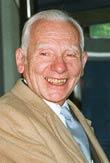"The 50-Year Shadow" by Nobel Peace Laureate Joseph Rotblat

The New York Times
17 May 2005
(also published in the International Herald Tribune, Paris)
The 50-Year Shadow
by Joseph Rotblat
FIFTY years ago, I joined Albert Einstein, Bertrand Russell and eight others in signing a manifesto warning of the dire consequences of nuclear war. This statement, the Russell-Einstein Manifesto, was Einstein's final public act. He died shortly after signing it. Now, in my 97th year, I am the only remaining signatory. Because of this, I feel it is my duty to carry Einstein's message forward, into this 60th year since the destruction of Hiroshima and Nagasaki, which evoked almost universal opposition to any further use of nuclear weapons.
I was the only scientist to resign on moral grounds from the United States nuclear weapons program known as the Manhattan Project. On Aug. 6, 1945, I switched on my radio and heard that we had dropped the bomb on Hiroshima. I knew that a new era had dawned in which nuclear weapons would be used, and I grew worried about the future of mankind.
Several years later, I met Bertrand Russell on the set of the BBC Television program "Panorama," where we discussed the new hydrogen bomb. I had become an authority on the biological effects of radiation after examining the fallout from the American hydrogen bomb test in Bikini Atoll in 1954. Russell, who was increasingly agitated about the developments, started to come to me for information. Russell decided to persuade a number of eminent scientists from around the world to join him in issuing a statement outlining the dangers of thermonuclear war and calling on the scientific community to convene a conference on averting that danger.
The most eminent scientist alive at that time was Albert Einstein, who responded immediately and enthusiastically to Russell's entreaty. And so the man who symbolized the height of human intellect adopted what became his last message - this manifesto, which implored governments and the public not to allow our civilization to be destroyed by human folly. The manifesto also highlighted the perils of scientific progress in a world rent by the titanic struggle over communism. I was the youngest of the 11 signatories, but Russell asked me to lead the press conference in London to present the manifesto to the public.
The year was 1955, and cold war fears and hostilities were at their height. We took action then because we felt that the world situation was entering a dangerous phase, in which extraordinary efforts were required to prevent a catastrophe.
Now, two generations later, as the representatives of nearly 190 nations meet in New York to discuss how to advance the Nuclear Nonproliferation Treaty, we face the same perils and new ones as well. Today we confront the possibilities of nuclear terrorism and of the development of yet more new nuclear warheads in the United States. The two former superpowers still hold enormous nuclear arsenals. North Korea and Iran are advancing their capability to build nuclear weapons. Other nations are increasingly likely to acquire nuclear arsenals on the excuse that they are needed for their security. The result could be a new nuclear arms race.
Fifty years ago we wrote: "We have to learn to think in a new way. We have to learn to ask ourselves, not what steps can be taken to give military victory to whatever group we prefer, for there no longer are such steps; the question we have to ask ourselves is: what steps can be taken to prevent a military contest of which the issue must be disastrous to all parties?" That question is as relevant today as it was in 1955. So is the manifesto's admonition: "Remember your humanity, and forget the rest."
Joseph Rotblat, a physicist and emeritus president of the Pugwash Conferences on Science and World Affairs, was awarded the Nobel Peace Prize in 1995.


3 Comments:
This comment has been removed by a blog administrator.
Vleeptron Pizza Slice! Let's all be Nancy Drew and the Hardy Boys! Let's be Sherlock Holmes! Let's be Miss Marple! Let's be Colombo! Let's be Sam Spade! Married couples can be Nora and Nick Charles! Dogs can be Asta!
Let's try to figure out where Anonymous comes from!
Is he
a he? |_| Yes |_| No (I got Impolitic's gender wrong when she started Commenting.)
Is heshe a
|_| Euro?
|_| Asio?
|_| Africo?
|_| Sudamericano?
|_| Norteamericano?
|_| Mesoamericano?
|_| Pacifico?
|_| Antarctico?
You've seen all the clues I've seen! Solve the mystery! (Or Anonymous could just tell us.)
Under Oath:
I am NOT Anonymous.
And I think Ayn Rand was a big dope.
(I AM JudgeDee, though. If you like mysteries, you should read the detective novels about Judge Dee, by the Dutch diplomat and Orientalist Robert van Gulik.)
Post a Comment
<< Home